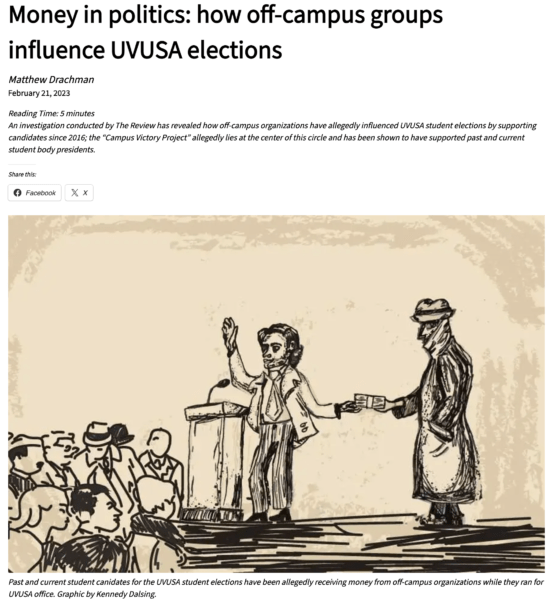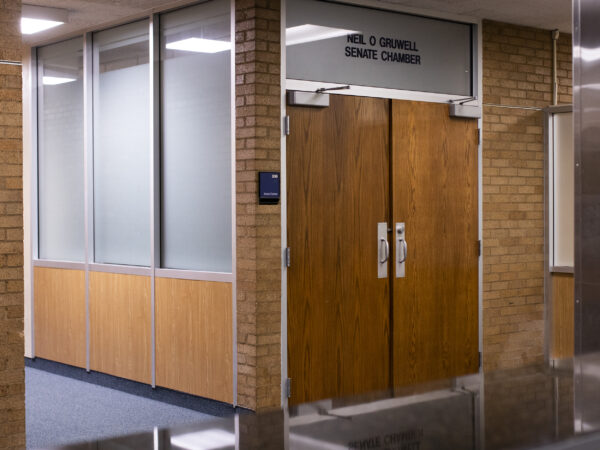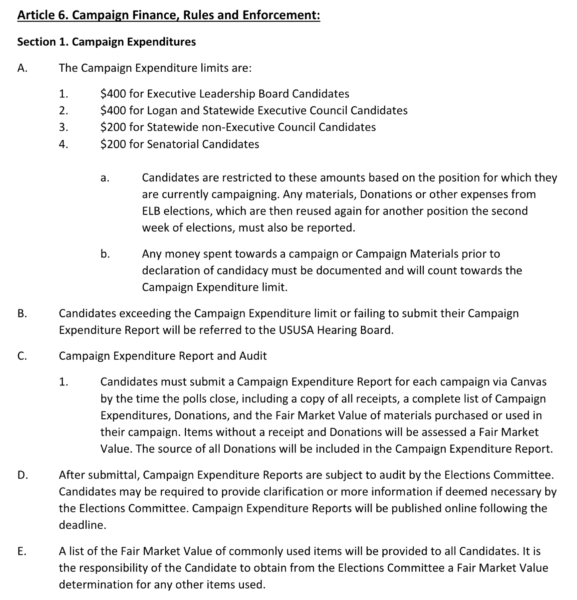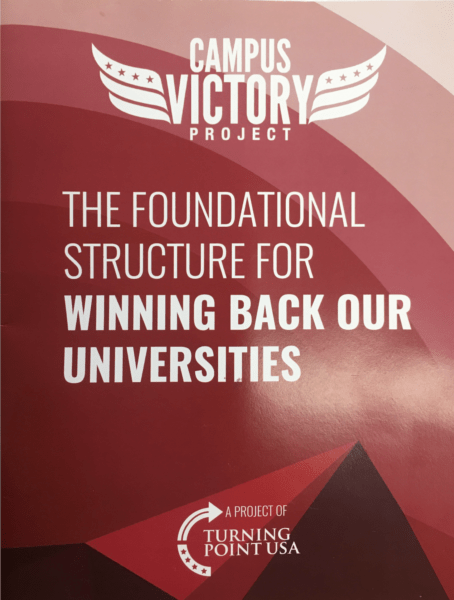Campaign donation amendment struck down; former, current officers speak on transparency
On Feb. 12, a proposed amendment to the USUSA constitution that would require candidates to disclose sources of third-party campaign donations was struck down in an Executive Leadership Board meeting.
The amendment, which proposed to change Article 3 Section 4H of the constitution, required that candidates report the source of any donation over the value of $50. The motion to strike the amendment passed unanimously, and it was struck down the next day in Logan Executive Council as well.
ELB consists of the USUSA President, executive vice president, student advocate vice president and chief of staff. Executive council includes those members, plus the Logan VP, public relations director and the executive directors of diversity and organizations, athletics and campus recreation, and student events.
According to the ELB minutes, the amendment was a response to the presence of third-party donors like Turning Point USA, a nonprofit organization that encourages conservative political action on college campuses.
Sarah Pope, the 2023-24 graduate studies senator, was part of the constitutional committee who wrote up the amendment but not the voting body. Pope said she believes students deserve transparency.
“There are organizations that have a vested interest in student politics,” Pope said. “I think it’s important that students know that when they’re voting for a candidate, they’re voting for somebody who is only representing students. And if they’re not, students deserve to know that.”
Reporting financials
Article 6 of the election bylaws outlines current expectations regarding expenditure reports, which candidates submit at the conclusion of the campaign window. They must include “a copy of all receipts, a complete list of Campaign Expenditures, Donations, and the Fair Market Value of materials purchased or used in their campaign.”
Carter Ottley, the 2023-24 USUSA PR director, said members of the elections committee are responsible for reviewing the submitted expenditure reports. Although the report includes a section to list donations, he said it’s usually empty.
“It could probably be pretty easy to get around it,” Ottley said. “We try to pay attention to people’s campaigns and whatnot, but if the elections committee missed something, and nobody else submits anything following, then it could get through us.”
In a text message to The Utah Statesman, Clara Alder, the 2022-23 USUSA President, said she didn’t have any evidence of candidates exceeding the $400 spending limit when she was campaigning. However, she said there is nothing in the constitution or bylaws that prevents a candidate from accepting more than the limit and just not using it on their campaign.
Tyson Packer, the 2023-24 student advocate VP, said there is no way to find out if a candidate received a donation and left it out of their report.
“Even if we did, we don’t have the legal means to necessarily punish them,” Packer said. “If a candidate does something, it takes something pretty drastic to get them kicked out of elections — so a lot of times what we’re looking at is minor fines, like $25-50, removal of campaign materials, and those are just very weak things for receiving a ton of money.”
There have been discussions about eliminating expenditure reports entirely because of the lack of legal standing for requiring candidates to submit financial information, Packer said, and USUSA’s inability to enforce the proposed amendment was one of the reasons it got struck down.
Pope didn’t feel this was a “valid reason” to not pass the amendment.
“None of our election finance bylaws are enforceable,” Pope said. “No one is ever in trouble. No one’s ever been barred from going into a position because they violated the bylaws.”
Jaxton Winder, the 2023-24 College of Science senator, said although he was in support of the amendment, he was taken by surprise by its final form, which he thought got changed because of concerns raised by the USU Office of Legal Affairs.
“The actual text that went to Executive Council was different than the one that I gave my thumbs up to. It apparently got changed pretty last minute,” Winder said. “As disappointed as I am that the actual goal of the amendment has not come to fruition, I can understand why that specific language of it didn’t. It needs to be worked on a lot more. We need to establish a very codified process for reporting these donations and oversight for it too.”
Winder said the language of the amendment could have blurred the lines of the advisory role the Student Involvement and Leadership Center takes over USUSA.
Abraham Rodriguez, 2023-24 USUSA President, said along with its lack of legal power, the amendment didn’t include enough details about the reporting process — whether donation sources would be listed on the expenditure report, the ballot, the candidate’s profile or somewhere else.
Packer said there were also concerns about the amendment from officers who accepted third-party funding for their own campaigns.
“When we kind of talked about it on ELB, I will admit there is some bias, because Aly Cinq-Mars, exec VP, and Abe Rodriguez, the USUSA President, both received funding from third party sources,” Packer said. “They were like, ‘Well, we got our whole campaigns paid for by third parties.’”
Rodriguez said he did not accept funding from Turning Point. The Statesman reached out to Cinq-Mars, but she declined to comment.
Political attention
The other main reason for striking the amendment was a concern about it drawing undue political attention to an apolitical election.
“I don’t like USUSA elections to be political. There’s not a lot that we do that could really be construed as political,” Packer said. “I was worried that bringing this amendment in would create a more divisive atmosphere.”
Ottley said while topics like DEI and sustainability could be viewed as political, most things USUSA works on are not.
“In the spirit of staying away from politics as much as possible, and just focusing on the students, it seemed like the best choice to not make that a huge focus of elections,” he said.
Brandon Sorensen, the incoming 2024-25 Logan VP, said USUSA should be focused on legislation for Utah State, not national politics.
“Politics is something that makes people unique but can also set barriers, and that’s not the type of barriers that we should have working as students in the Student Association, so I think it’s beneficial to have that not as a factor,” Sorensen said. “We were voted in and elected because of what we represent, and I would hate for another third party to bias decisions.”
Similarly, incoming 2024-25 USUSA President Matt Richey said he felt candidate platforms should be the primary focus of elections.
“If I want students to be more aware of campaign finances or candidate platforms, I’m going to choose candidate platforms every time,” Richey said. “This is a different kind of election than regular politics.”
Pope said the amendment was not a move to garner political attention.
“Transparency is not political, unless you have something to hide,” she said.
Winder said he thought the officers who didn’t think the amendment was necessary may have been “a bit unaware of how much external money has already been funneled through USUSA” by third-party donors like Turning Point.
Turning Point USA and Campus Victory Project
Several years ago, Turning Point rolled out an initiative called Campus Victory Project. In a brochure circulated around 2017, Turning Point claimed student government associations had been “controlled by the left for decades” and had appropriated “hundreds of millions of dollars of student fees to intentionally push a coordinated radical progressive agenda.” In response, CVP’s mission was to “commandeer the top office of Student Body President at each of the most recognizable and influential American universities.”
The brochure is directed towards potential donors and recruits. It includes a scalable administration plan, directives for “new leadership education” and a list of “targeted races,” of which Utah State is listed among other schools in the Pac-12 region.
The Statesman reached out to CVP but did not receive a response.
Though CVP was associated with Turning Point in the past, any direct mention of a connection has since been erased. The CVP website does not mention Turning Point, or vice versa; however, the website font and design are nearly identical for both sites, and both organizations operate from the same business complex in Phoenix, Arizona.
According to a map on their website, Turning Point has student chapters at several universities in Utah, including Weber State, the U, Salt Lake Community College, Utah Valley University, and Brigham Young University. There is no chapter registered at USU.
The USUSA club directory lists a Turning Point USA club, but the link is no longer active.
Third-party donations
Turning Point and CVP — whose titles were frequently used interchangeably by USUSA officers — make donations to student government campaigns and pay for students to attend conferences. At USU, their presence in campaign finances goes back several years.
According to his LinkedIn profile, Porter Casdorph, the 2021-22 student body VP, worked at CVP as a regional recruiter during his USUSA tenure. In a phone call with the Statesman, Casdorph referred to his CVP position as a “resume filler.” He said the job was focused on recruiting students to attend leadership conferences a few times a year.
Rodriguez said CVP is one of many organizations who reach out to student government leaders to invite them to conferences. But attending a leadership conference held by a group like Turning Point as a student is different than attending as an elected officer, he said.
“At least on our campus, you are representing about 27,000 students, right, and they’re all going to have different beliefs, and so you want to be mindful of that,” Rodriguez said. “We’re advocating for student interests, we’re advocating for the Aggie community, so we should just stick to that mission.”
During his campaign for president last year, Rodriguez said he was approached by a previous USUSA officer who worked for CVP, but he did not accept money.
“I was approached about it and got to learn more about what this organization does. But, I mean, at the end of the day, I decided to just rely on my family for a lot of that funding,” Rodriguez said.
Donations from family members fall under the third-party category, and the amendment language was vague about reporting these versus donations from businesses or nonprofit organizations. Both Rodriguez and Packer cited this lack of clarity as a reason for voting against the amendment.
Pope, who campaigned for president this year, said she was not approached by Turning Point or CVP, nor did she accept donations from other third-party sources, including the new USU chapter of the Communication Workers of America labor union, which she helped start.
“I didn’t ask our union to fund me, and they didn’t offer,” Pope said. “I think if they had offered, I probably would have turned them down.”
As an elected officer, Pope said she wanted to make sure she only had obligations to the students she was representing.
Richey said he received a donation of around $150 from CVP. He heard about the group from 2021-22 USUSA President Lucas Stevens after Richey reached out to ask for tips on running a presidential campaign.
Although he was initially hesitant about the idea of “free money,” as well as CVP’s connection to Turning Point, specifically because of Richey’s own support of DEI programs, he said conversations with Stevens helped change his mind.
“The people I was working with directly, they want the best for Utah State. They’re Utah State alum; they’re still committed to seeing the best for Utah State and so that helped me trust them,” Richey said. “They’ve never asked for anything in return.”
The Statesman reached out to Stevens but did not receive a response in time for publication.
Alder said she was offered donations from CVP, but she never accepted.
“I was approached before, during, and after my campaign. I never was drawn to it. I felt that I didn’t need extra support. Everyone I needed was at USU,” Alder wrote. “These big organizations are not as in-touch with campus issues compared to the people who are actually on campus.”
In an email to the Statesman, Jonathan Mousley, the 2021-22 science senator, said he was never approached by any third-party group, political or not, during his campaign. He was, however, aware of other candidates and officers who were “involved in some capacity with such organizations and had attended a conference at least one occasion.”
Mousley said he didn’t think issues that student governments work on, including student outreach and better advertising of resources, seemed to be the priority of organizations like Turning Point.
“They seem to be more about sparking culture war than improving a campus for all,” Mousley wrote.

The Review reported on the impact of Campus Victory Project in UVU’s student body elections last year.
Level of impact
CVP also has a presence at other Utah universities.
Rodriguez said third-party funding, specifically in relation to CVP, has been “a hot topic” in the Utah Student Association, a coalition of student body presidents from universities around the state.
According to a map on their website, Turning Point has student chapters at several universities in Utah, including Weber State, the U, Salt Lake Community College, Utah Valley University, and Brigham Young University. There is no chapter registered at USU.
The USUSA club directory lists a Turning Point USA club, but the link is no longer active.
According to an article published last year in the UVU Review, Casdorph signed off on a donation for “personal campaign expenditures” in 2022 for Lexi Soto, who was running for student body president. UVU does not require candidates to disclose donation amounts, nor do they enforce spending caps.
Both Richey and Packer said the existence of USUSA’s spending caps — $400 for positions on ELB, Logan Executive Council and Statewide Executive Council and $200 for college senators — made them less concerned about the impact of third-party donations.
“Where those are in place, I think that it kind of lessens the significance of where the money is coming from because there are so many sources to pull from,” Richey said. “If it wasn’t Campus Victory Project, it would have been my family.”
Ottley said during his 2022 campaign for CHaSS senator, he was never approached by CVP, which he thought was probably because of the small size of the position.
Packer said he was not interested in accepting third-party donations because of his own political and personal independence.
“I think the higher the amount of money that you’re given, the more Turning Point is expecting a return on their investment,” Packer said. “Whether they reach out or whether they require things of you, I don’t like being indebted to someone for something.”
Potential for external influences
Of the six former and current USUSA officers interviewed for this story, not one said they noticed undue political influence from officers who received funding from third-party political sources or were otherwise involved with them.
“In my experience, everyone I have worked with in USUSA were good people, with Utah State’s best interest in mind,” Alder wrote.
“As far as I know, looking back at past legislation, I’ve never seen anything that could be construed as being influenced by a third-party source,” Packer said.
“Some of our student leaders have participated in some of their leadership conferences and what not,” Rodriguez said, “but, in the end, none of them really ever brought anything politicizing to the room. There was no room for an agenda.”
Rodriguez said officers follow charters to guide their work during their time in office.
“Every single one of our charters outlines our duties, our responsibilities,” Rodriguez said. “That is there to keep every single officer in check so that the work that they’re doing is only centered on USU students, USU campus life.”
Winder said he didn’t see any particular influence from third-party donations, and that he doesn’t believe fellow officers who accepted money did so with malicious intent.
Winder did mention that during fall semester, there was a brief discussion in USUSA about a resolution to support Israel after the Oct. 7 Hamas attack, but it was “pretty quickly deemed not exactly appropriate” to make statements for the student body as a whole about “a very complicated topic.”
“I know that a lot of these organizations, particularly Campus Victory Project, has kind of encouraged some of their student leaders to be very pro-Israel in the wake of all of this,” Winder said. “If that were to have come to fruition, I would have been concerned. But it didn’t.”
Incoming officers also did not see outside influence as a concern.
“From my experience with officers that I’ve known that have worked with Turning Point or accepted that donation, I’ve noticed no change in what their motives were or what they were trying to pass or any type of change in who they were as a person,” Sorensen said.
Sydney Lyman, the incoming 2024-25 student advocate VP, said in the past year, there were people who came “out of the woodworks” to support initiatives that could be seen as counter to what Turning Point promotes. She specifically referenced the “widespread support” of the Voices of Aggies initiative, put together by the Government Relations Council to support DEI in the face of oppositional state legislation.
“I think that if, you know, third-party money had really infiltrated the student government, that it would be significantly more divisive than it was,” Lyman said.
Richey said if CVP were to approach him about passing legislation in exchange for their donation to his campaign, he would refuse.
“I do not believe that would ever happen. But if it did, I would say, ‘Here’s your money back. Go shove it,’” Richey said. “I know why I’m here and I know what I’m about.”

The Neil O. Gruwell Senate Chamber is seen in the TSC.
Secrecy and transparency
Accepting a donation from a third-party source, political or otherwise, is not prohibited by anything in the USUSA constitution or the election bylaws. Candidates who have done so have not violated any rules, but secrecy still surrounds the topic.
After being asked the name of the USUSA officer who connected him with CVP, Casdorph accused the Statesman of going on a “ghost hunt,” and did not respond to further questions.
“It’s a very touchy subject,” Winder said. “It’s one that I think a lot of people don’t exactly want to admit is an issue, so it’s almost easier to pretend that the problem doesn’t exist than to discuss it and become aware of the fact that it needs to be addressed.”
Winder said he felt comfortable speaking on the topic because he has built a reputation of speaking up in USUSA circles.
“We should have transparency and allow the student body to hold us accountable if any of that money does start to influence our decision making,” Winder said.
Richey, who was open about the donation he received from CVP, also said he understood the hesitancy.
“Money is dirty. Politics are dirty — even though it’s not at a campus level, it is very easy to feel that way,” Richey said. “I can definitely empathize with other candidates being nervous to talk about it because of that.”
“If you’re worried about transparency, what does that say about your sources where you’re getting money from?” Pope said. “And if you’re not getting money from third party sources, then why are you so worried about it?”

Article 6 of the USUSA election bylaws, which are updated each year by the president and student advocate VP.
Student financial barriers
Students are often in financially precarious positions. Spending several hundred dollars on a campaign isn’t a small decision, so donations from third-party sources are enticing.
Lyman said she had to save up to prepare for her campaign, and during that time, she heard “through the involvement grapevine” that Turning Point was a funding option, though she was never approached by them.
“I’m not even sure that people that would take money from those organizations believe the things that that organization says. They just are trying to run a campaign,” Lyman said. “There’s limited financial resources available to them, so they’re trying to utilize what they have.”
Candidates who said they did not accept third-party donations, including Sorensen, Lyman and Packer, said investing their own money into their campaigns increased their commitment.
“You put in your hard time and your hard money,” Sorensen said, “Not to say that others don’t appreciate as much, but it’s just — there’s a lot more on the line for you.”
Regardless of their effect on commitment, cash donations can give candidates a leg-up in visibility.
“It does have an impact — spending money directly translates to cards handed out, A-frame that people are seeing,” Packer said.
Some candidates do campaign successfully without spending a lot of their own money — including Winder, who won his academic senate seat last year without spending a dime.
However, Winder acknowledged that his campaign, which only involved the students in the College of Science, was less “contentious” than a university-wide campaign might be, and that he was privileged to have made many personal connections.
Personal connections, whether they provide resources or visibility, make a difference. Lyman said a friend donated buttons to her campaign, and Sorensen said he relied on a main team of nine people who donated their time and effort to running his campaign.
“There are a lot of people who are able to rent A-frames from someone else who ran last year or a friend and just pay them five bucks instead of paying the 50-60 to build it themselves with wood,” Ottley said. “That’s another way that some people are able to stretch their budget just because they have those connections — connections to people with resources.”
Mousley said despite the relatively low spending caps, some students may still not have the financial resources to run a campaign. In that case, donations become a stepping stone.
“I’d like to live in a world where good ideas earn more votes than good and plentiful advertising (which comes at a cost), but that’s not the case,” Mousley wrote. “It’s worth considering that donations could enable someone who otherwise wouldn’t have the resources to run at all.”
Lyman said there are resources available “through word of mouth” for students looking to get involved.
“I would encourage students that want to run to come talk to a student leader that’s already in office, that has run a campaign, because they will tell you kind of how to run a campaign in the least expensive way possible,” Lyman said. “Don’t spend $200 on your A-frame. Come talk to us, we will tell you how to build one.”
Pope acknowledged that running for office can be inaccessible for people who don’t have expendable finances, and she emphasized that the amendment would not have prevented candidates from accepting donations for their campaigns.
Despite their votes against it, both Packer and Rodriguez said they were open to the intent behind the amendment.
“I think if we could find a way to rewrite the amendment in a way that it was in the election bylaws, it was clear, I think it would be beneficial, because I think more transparency is always a better thing than less transparency,” Packer said.
Election bylaws are reviewed each fall semester, Packer said, by the president and student advocate VP, and amendments to them are voted on during the spring election cycle. Students who are interested in proposing a change to the bylaws can contact Richey or Lyman.
In the last weeks of his tenure, Winder said he focused on making sure the incoming 2024-25 USUSA officers were aware of the issue, and he believed they were open to continuing work on potential amendments.
“I think it’s difficult to roll out in a meaningful way to students, but that doesn’t mean it’s not worth doing,” Lyman said. “It just means that it needs to be more creative and tailored.”
Winder encouraged students to get involved and stay informed about student government, especially by attending USUSA meetings, which are public, and speaking up about things they care about.
“They can find student government leaders that care about these issues as well and co-sponsor with them,” Winder said. “If an individual in the general USUSA body wants to see this amendment come to fruition, they can start working on it, even if they’re not a student government leader.”
Maren Archibald is a senior studying technical communication and rhetoric.
— maren.archibald@usu.edu


